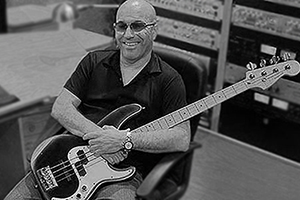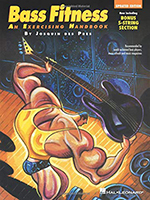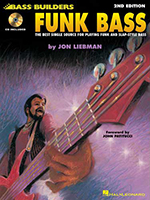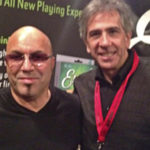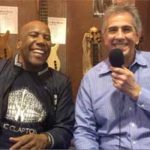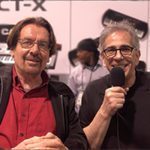French-born bassist/producer opens up about current projects and keeping it simple
Exclusive interview with FBPO’s Jon Liebman
September 6, 2021
Josquin Des Pres first made a name for himself in his native France the 1970s, playing with acts like the prog-rock/fusion group Édition Spéciale and jazz violinist Didier Lockwood. He later relocated to the United States, where he would work with ex-Mahavishnu violinist Jerry Goodman, and co-found the rock outfit Stress. Since that time, Des Pres has become a respected producer and songwriter who’s collaborated with the likes of Bernie Taupin, The Gipsy Kings, Jason Mraz, Jack Johnson, Billy Sheehan, The Young Dubliners, Bunny Brunel, and Stanley Clarke. His musical compositions can also be heard on more than 40 different television shows, appearing on networks like CBS, NBC, MTV, CNN, and the Discovery Channel. Beyond that, Des Pres is also a prolific author and educator, who’s written books and contributed to audio-visual media for publishers including Hal Leonard Corporation and Mel Bay Publications.
FBPO: What’s keeping you busy these days?
JDP: I’m working a lot as a producer and songwriter. I formed a production company with another songwriter, Michael Natter, one of Jason Mraz’s co-writers, and we decided to take on different artists. Some of them are American Idol top 10 contestants, or winners or finalists. We write songs for and with them, and then we look for record deals. Of course, I play bass whenever I can on their projects. One of the artists we picked up was a girl from the Philippines I found called Renee Dominique. In 2019, I heard a Samsung commercial, and I thought she was a great artist. I heard the voice and I had to find out who that was. She’s in the Philippines. We started exchanging emails and we had her do a couple of demos, and we played one for Jason Mraz. At first, he was a little bit lukewarm about it. Then we wrote a song and he decided to rework our song, and then he told us, “Hey guys, I’m starting my tour in Asia, in Manila. Why don’t I pick her up and we’ll do some dates?” I decided, “Well, if Jason is going to do that, I’m going to hop on a plane and I’m going to follow.” All this happened and she got signed on Universal Germany. We put out a single and I think we’re at about 60 million combined streams right now and doing very well.
FBPO: Did you play bass on it?
JDP: Yeah, I played bass on it. We’ve worked with quite a few singers from American Idol. I also discovered a new singer on American Idol called Makayla Phillips, who’s spectacular, amazing voice. I do a combination of bass guitar and keyboard bass. And then another one called Katie Belle who was on Idol also.
FBPO: I’m glad to hear you’re playing bass on some of the tracks. How much actual bass playing are you able to do in addition to all your production work?
JDP: I do a lot of production music for Universal. I like to use my bass playing everywhere I can, with my creativity and as a songwriter, producer, composer… I needed to expand into everywhere I could make a living. I have a deal where I create music for Universal, IMG, Warner Bros. Television, and all that. I play bass on many of these tracks. For example, I did a whole collection of Nu-Disco tracks, in the style of current pop artists, like Dua Lipa. Basically, what they’re doing is reminiscent of disco. I’m loving playing bass on that. The music producer didn’t know I was a bass player, and he asks me, “Can you do some music like Nu Disco?” And I go, “Dude, I’m a bass player!” In a given month, I’m playing at least two bass sessions a week.
FBPO: Are you still writing bass books?
JDP: No, I haven’t written a book since 1999. Your Funk Bass book is probably still doing very well. They updated my Bass Fitness book when the app came out. They updated the book, made it a little thicker, they added a five-string section.
FBPO: Tell me about your basses and your gear.
JDP: I always use my Markbass combo amp. I place a Telefunken TF 51 microphone about one foot away from the speaker, and I also go direct. My two go-to instruments are a 1964 Fender Precision bass that I’ve owned since 1970. That thing is beat up, but it plays incredibly well. There’s nothing original about it, but it’s a work tool. The second one is a 1989 Fender Precision Bass Plus with a maple neck. They have a really nice kind of growly sound.
FBPO: What kind of strings do you play?
JDP: I play La Bella. I’ve been with La Bella for decades. They’re a little bit like Rotosounds, not as aggressive, and they last longer. That’s what I like. And more than anything, they’ll custom make any set I want. For example, on one of my P basses, I have 40, 60, 80, 100, and on my other P bass, I have a very light set, which is 35 through 95.
FBPO: What advice do you have for somebody who wants to learn bass? What do you think is important?
JDP: Well, I know you’re going to relate to this. Learn how to play with other people. I see a lot of bass acrobats. We see them all on YouTube, and what they do is spectacular, it’s great and it’s amazing. I watch it for entertainment value. But to this day, Nathan East is the most hired bass player in the mainstream world. So if you want to have a career playing bass, play the groove, play the song. It’s all about the song, and the bass is there to complement the song. I mean, ultimately it was created by Leo Fender as an instrument to replace the upright bass, which was the foundation of the song. It still is in that role. For example, we know in Nashville who’s getting hired are the guys who are laying it down, song-oriented material. To me, it works the same way. Working, writing production music… it’s about the piece of music we’re writing. It’s about simplicity and making music understandable for the layman, for the plumber, the mailman and the everyday guy. I love simplicity, even though I came from a fusion world. I went into this simplicity kind of world because, ultimately, I think it’s the role of the bass. So the advice is practice your chops, and that’s great to get your fingers limbered, but don’t forget your role. It’s laying down the groove.
See Jon’s blog, with key takeaways from this interview here.
The following books are available in the FBPO store:
Bass Fitness, by Josquin Des Pres
